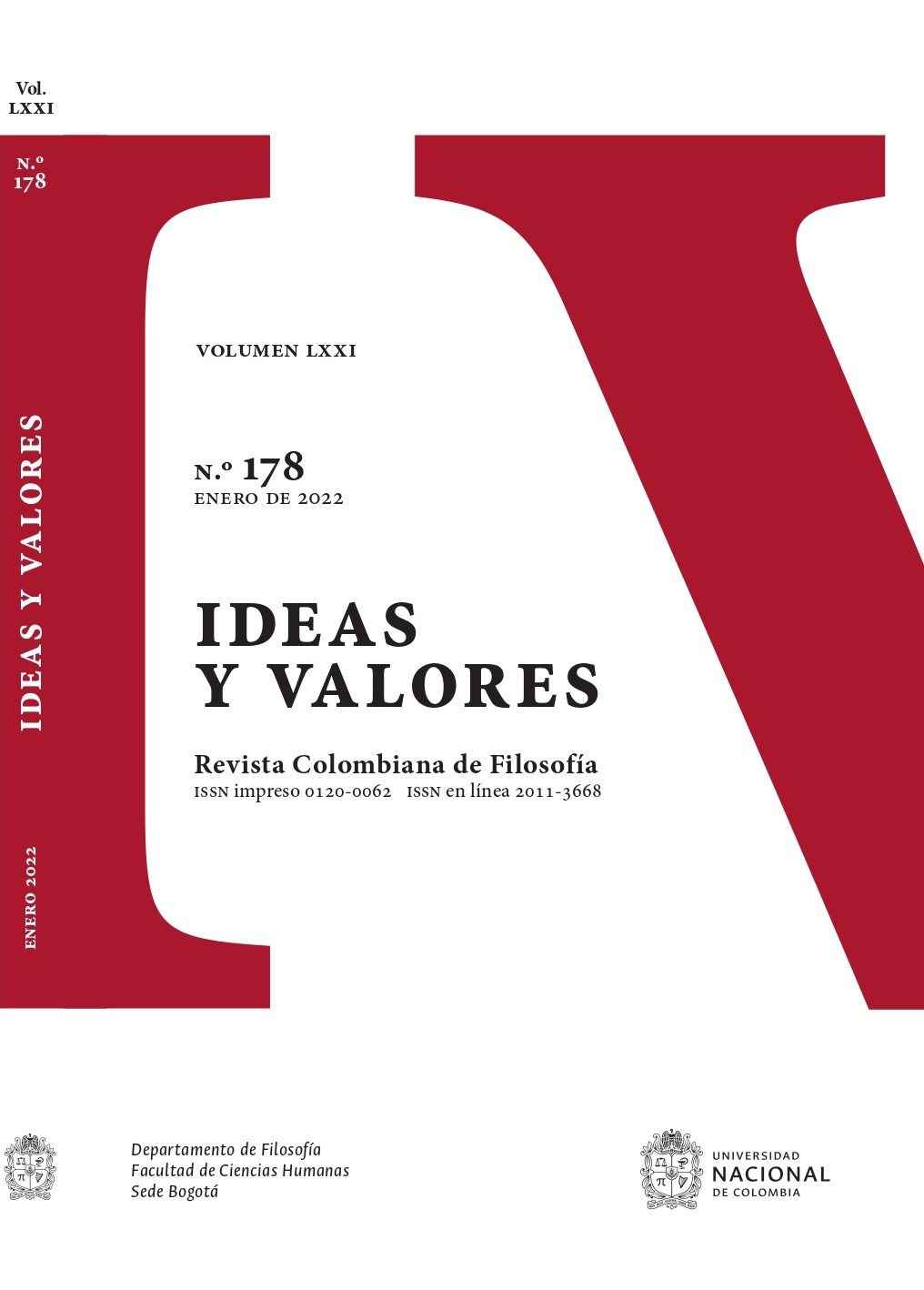Parrhesía. El lugar del “decir veraz” en el juego democrático
Parrhesia. The Place of the “True-Telling” in the Democratic Practice
DOI:
https://doi.org/10.15446/ideasyvalores.v71n178.75405Keywords:
Parrhesía, Agonismo, Decir veraz, Democracia radical (es)Parrhesia, Agonism, True-telling, Radical Democracy (en)
Downloads
La parrhesía constituye una práctica de “decir veraz” que Michel Foucault investiga genealógicamente en sus últimos seminarios del Colegio de Francia, como una de las maneras originales de constitución de uno mismo en la cultura grecolatina antigua. En este trabajo, dicha noción de parrhesía es desplegada en toda su contemporaneidad política, afirmándose que constituye un complemento fundamental para la tesis agonísitica de la democracia, en especial la defendida por Chantal Mouffe. El “decir veraz” del parrhesiasta, al interpelar de manera radical el statu quo de la identidad colectiva constituida en el proceso de politización propio de la democracia radical, subvierte y transforma dicha identidad en un objeto permanente de disputa. Se recupera así el sentido del polemos propio de la práctica democrática.
The parrhesia is a practice of “true-telling” that Michel Foucault genealogically researches in his last course of the College of France, as one of the most singulars ways of becoming oneself in the ancient Greco Latin culture. In this paper, such a notion of parrhesia is developed in its whole political contemporaneity, and it is assumed as a key component for the agonistic thesis of democracy, especially in Chantal Mouffe’s work. The “true-telling” of parrhesiast, while contesting in a radical way the status quo of the collective identity formed in the own process of politization of radical democracy, it subverts and transform this given identity in an object of constant dispute. The polemos sense characteristic of democracy is in that way recuperated.
References
Álvarez Yágüez, J. “Introducción.” La Parrêsía. Por Michel Foucault. Madrid: Biblioteca Nueva, 2017. 15-92.
Bennington, G. Scatter 1. The Politics of Politics in Foucault, Heidegger and Derrida. Nueva York: Fordham University Press, 2016. DOI: https://doi.org/10.5422/fordham/9780823270521.001.0001
Burch, K. “Parrhesia as a principle of democratic pedagogy.” Philosophical Studies in Education 40 (2009): 71-82.
Blaug, R. “New Developments in Deliberative Democracy.” Politics 16.2 (1996): 72-76. DOI: https://doi.org/10.1111/j.1467-9256.1996.tb00023.x
Cadahia, L. “Un modo de resistir al biopoder: el lugar de la parresia en las reflexiones ético-políticas de Michel Foucault.” Bajo Palabra. Revista de Filosofía 5 (2010): 288-299.
Castro, E. Diccionario Foucault. Buenos Aires: Siglo Veintiuno Editores, 2011.
Dahl, R. A. Poliarchy, Participation and Opposition. New Haven (ct) y London: Yale University Press, 1971.
Dávila, J. “Michel Foucault: ética de la palabra y vida académica.” Utopía y Praxis Latinoamericana 12.39 (2007): 107-132.
Dreyfus, H. L. y Rabinow, P. Michel Foucault: más allá del estructuralismo y la hermenéutica. Buenos Aires: Monte Hermoso Ediciones, 2017.
Dyrberg, T. Foucault on the Politics of Parrhesia. Londres: Palgrave Macmillan, 2014. DOI: https://doi.org/10.1057/9781137368355
Durán Barba, J. y Nieto, S. El arte de ganar. Cómo usar el ataque en campañas electorales exitosas. Buenos Aires: Debate, 2010.
Fishkin, J. S. The Dialogue of Justice: Towards a Self-Reflective Society. New Haven: Yale University Press, 1992. DOI: https://doi.org/10.12987/9780300156706
Folkers, A. “Daring the Truth: Foucault, Parrhesia and the Genealogy of Critique.” Theory, Culture & Society 33.i (2016): 3-28. DOI: https://doi.org/10.1177/0263276414558885
Foucault, M. Fearless Speech. Los Ángeles: Semiotext(e), 2001.
Foucault, M. La hermenéutica del sujeto. Buenos Aires: Fondo de Cultura Económica, 2008.
Foucault, M. El gobierno de sí y de los otros. Buenos Aires: Fondo de Cultura Económica, 2009.
Foucault, M. El coraje de la verdad. Buenos Aires: Fondo de Cultura Económica, 2010.
Foucault, M. Del gobierno de los vivos. Buenos Aires: Fondo de Cultura Económica, 2014.
Flynn, T. “Foucault as a parrhesiast: his last course at the Collège de France.” Philosophy and Social Criticism xii.2-3 (1987): 213-229. DOI: https://doi.org/10.1177/019145378701200207
Gros, F. “La parresía en Foucault (1982-1984).” Foucault. El coraje de la verdad. Madrid: Arena Libros, 2014. 131-140.
Habermas, J. “The Public Sphere: An Encyclopedia Article.” New German Critique 3 (1974): 49-55. DOI: https://doi.org/10.2307/487737
Han, B. Foucault’s Critical Project. Stanford: Stanford University Press, 2002.
Lacan, J. El Seminario Libro x, La Angustia. Buenos Aires: Paidós, 1992a.
Lacan, J. El Seminario Libro xi, Los cuatro conceptos fundamentales del Psicoanálisis. Buenos Aires: Paidós, 1992b.
Laclau, E. “Atisbando el Futuro.” Laclau. Aproximaciones críticas a su obra. Comps. Simón Critchley y Oliver Marchart. Buenos Aires: Fondo de Cultura Económica, 2008. 347-404.
Laclau, E. y Mouffe, Ch. Hegemonía y Estrategia Socialista. Hacia una radicalización de la democracia. Madrid: Siglo Veintiuno Editores, 1987.
McGushin, E. F. Foucault’s Askēsis. An Introduction to the Philosophical Life. Evanston: Northwestern University Press, 2007.
Manin, B. “On Legitimacy and Political Deliberation.” Political Theory 15.3 (1987): 351-359. DOI: https://doi.org/10.1177/0090591787015003005
Maxwell, L. “The politics and gender of truth-telling in Foucault’s lectures on parrhesia.” Contemporary Politcal Theory 18 (2019): 22-42. DOI: https://doi.org/10.1057/s41296-018-0224-5
Mouffe, C. El retorno de lo político. Buenos Aires: Paidós, 1999.
Mouffe, C. La paradoja democrática. Barcelona: Gedisa, 2003.
Mouffe, C. En torno a lo político. Madrid: Fondo de Cultura Económica, 2007.
Mouffe, C. El desafío de Carl Schmitt. Buenos Aires: Prometeo, 2011.
Mouffe, C. Agonística. Madrid: Fondo de Cultura Económica, 2014.
Novak, D. R. “Engaging Parrhesia in a Democracy: Malcolm X as a Truth-teller.” Southern Communication Journal 71.1 (2006): 25-43. DOI: https://doi.org/10.1080/10417940500503480
Panizza, F. “Introducción.” El populismo como espejo de la democracia. Buenos Aires: Fondo de Cultura Económica, 2009. 9-49.
Plutarco. Vidas paralelas. Vol. 3. Buenos Aires: Anaconda, 1947.
Rosanvallon, P. La contre-démocratie. La politique à l’àge de la défiance. París: Ed. Du Seuil, 2006.
Rosenberg, A. y Milchman, A. “The Final Foucault: Government of Other and Government of the Self.” A Foucault for the 21st Century. Govermentality, Biopolitics and Discipline in the New Millennium. Eds. Sam Binkley y Jorge Capetillo-Ponce. Newcastle: Cambridge Scholar Publishing, 2009. 62-71.
Sartori, G. The Theory of Democracy Revisited. Chatham: Chatham House. 1987.
Schmitt, C. El Concepto de lo Político. Madrid: Alianza Editorial.1991.
Stigler, G. J. The Citizen and the State: Essays on Regulation. Chicago: University Press, 1975.
Tucídides. “El discurso fúnebre de Pericles.” Estudios Públicos 11 (1983): 1-10.
Valenzuela, A. El Quiebre de la Democracia en Chile. Santiago: Ediciones Universidad Diego Portales, 2013.
Vallespín, F. y Bascuñán, M. M. Populismos. Madrid: Alianza Editorial, 2017.
Žižek, S. El Sublime Objeto de la Ideología. Ciudad de México: Siglo Veintiuno Editores, 1992.
Žižek, S. “The Undergrowth of Enjoyment: How Popular Culture Can Serve as an Introduction to Lacan?” The Žižek Reader. Eds. Elizabeth Wright y Edmond Wright. Oxford: Blackwell Publishing, 1999. 11-36.
How to Cite
MODERN-LANGUAGE-ASSOCIATION
ACM
ACS
APA
ABNT
Chicago
Harvard
IEEE
Turabian
Vancouver
Download Citation
License
Copyright (c) 2020 Los derechos son del autor(es), quien(es) puede re-publicar en parte o en su totalidad el documento ya publicado en la revista siempre y cuando se dé el debido reconocimiento a Ideas y Valores

This work is licensed under a Creative Commons Attribution-NonCommercial-NoDerivatives 4.0 International License.
The Creative Commons Attribution-NonComnercial-No Derivatives 4.0 Internacional License authorizes copying and redistributing the material in any means or format, provided that credit is granted to the authors and to Ideas y Valores as the source of the original publication. Copying or distributing the contents of the journal for commercial purposes is not allowed; neither is the adaptation, derivation, or transformation of the contents, without previous authorization by the authors and the editors of Ideas y Valores. For further information regarding the terms of this license, please consult http://creativecommons.org/licenses/by-nc-nd/4.0/legalcode.







1.jpg)
.png)


1.png)
.png)
.png)
.jpg)

.png)









